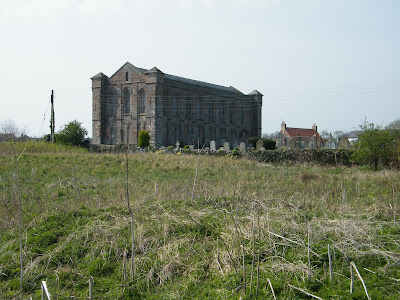1. The Anglo-Saxon ‘Age’ covers quite a few centuries (from the 400s to 1066!) What is your particular favourite period? Why?
I think my favourite periods are the seventh and the tenth centuries. In the seventh, the English began to convert to Christianity, the English kingdoms began to be formed, and one of the most interesting and perhaps inaccurately presented families emerged: Penda, the last pagan king, and his numerous offspring. As far as I can tell, he remained faithful to his one and only wife, and almost all of their children took the religious life. Not bad for a ‘heathen’! And religious life, at that time, meant abbeys where monks and nuns lived alongside each other, and where the abbeys were run by females, one of whom even educated future bishops. Quite the unusual set-up compared with other medieval periods.
 |
| Coldingham Priory, showing the dig site where the A/S abbey was found. The powerful abbess who ruled here in the seventh century features in The Sins of the Father |
The tenth century, once my heroine Æthelflæd and her brother had done their bit, was relatively free of Viking incursions, but the little-known reigns of the kings that weren’t blighted by these attacks saw noblemen developing as canny politicians, and Churchmen being Machiavellian before Machiavelli was even born. This was a time of intrigue, assassination but also a perid which saw the erstwhile kingdoms come together pretty much under a single banner. (It unravelled a bit at the end of the century with the reign of Æthelred the ‘Unready’...)
 |
| Edgar being crowned by Archbishop Dunstan a scene featured in Alvar the Kingmaker |
2. If you could select one artefact to have for your very own (regardless of its value!) what would you choose?
Just one?! There is so much to choose from because, despite its label ‘The Dark Ages’, this was a period of beautiful books, exquisite jewels, and intricately decorated weaponry. I’m sure everyone is aware of the staggering and glittering ‘bling’ of the Staffordshire Hoard* and the Sutton Hoo burial. But the one item I would love to own has to be the comparatively rather dull piece known as the Æthelswith ring. This item is too large to be a ring designed for a female hand and seems to have been commissioned by Queen Æthelswith, who was not only a queen of Mercia, but a sister of Alfred the Great, and the mother of Æthelflæd, Lady of the Mercians. To own an item with a known connection to Æthelflæd’s mother would thrill me no end. In the meantime, I must make to do with my replica:
3. You have been granted a wish to change one thing that happened during the Anglo-Saxon period – what would you change?
I always think it would have been nice had Edmund Ironside not died, either by wounds or treachery (the jury is still very much out on that one). He was a great warrior, not at all a chip off the block, given that his father was the afore-mentioned Æthelred the ‘Unready’, and his descendants were involved in the tussle for the English crown in 1066 and afterwards. But perhaps a tiny thing, if altered, might have really changed future events, and that’s the removal of Æthelflæd’s daughter, Ælfwynn, from power after her mother’s death. She did, albeit briefly, succeed her mother as Lady of the Mercians and England would have to wait until the Tudor age before a woman succeeded another woman to power. I often find myself wondering what the fate of Mercia would have been, although if Hastings and 1066 had still happened, then we know that answer.
It’s always fun, though, to think, What If, which is pretty much how the book 1066 Turned Upside Down came about.
 |
| Æthelflæd, Lady of the Mercians, subject of my novel To Be A Queen |
 |
| Buy the book (now also available in paperback) |
For the three questions set by
Annie for Helen to answer
go to Annie's Blog
thank you for following our tour
we hope you have enjoyed it!
 |
| e-book: special low price during October the story of Queen Emma c. 984 – 6 March 1052 (US/Canada only) < Did you miss anything? Revisit the Tour on Annie and Helen's Blogs Welcome - time travel with Annie and Helen Annie: The Staffordshire Hoard Helen: What If ? Annie: Wandering Around England Annie: Anglo-Saxon animals Three questions for Annie Three questions for Helen |




No comments:
Post a Comment
Thank you for leaving a comment - it should appear soon. If you are having problems, contact me on author AT helenhollick DOT net and I will post your comment for you. That said ...SPAMMERS or rudeness will be composted or turned into toads.
Helen